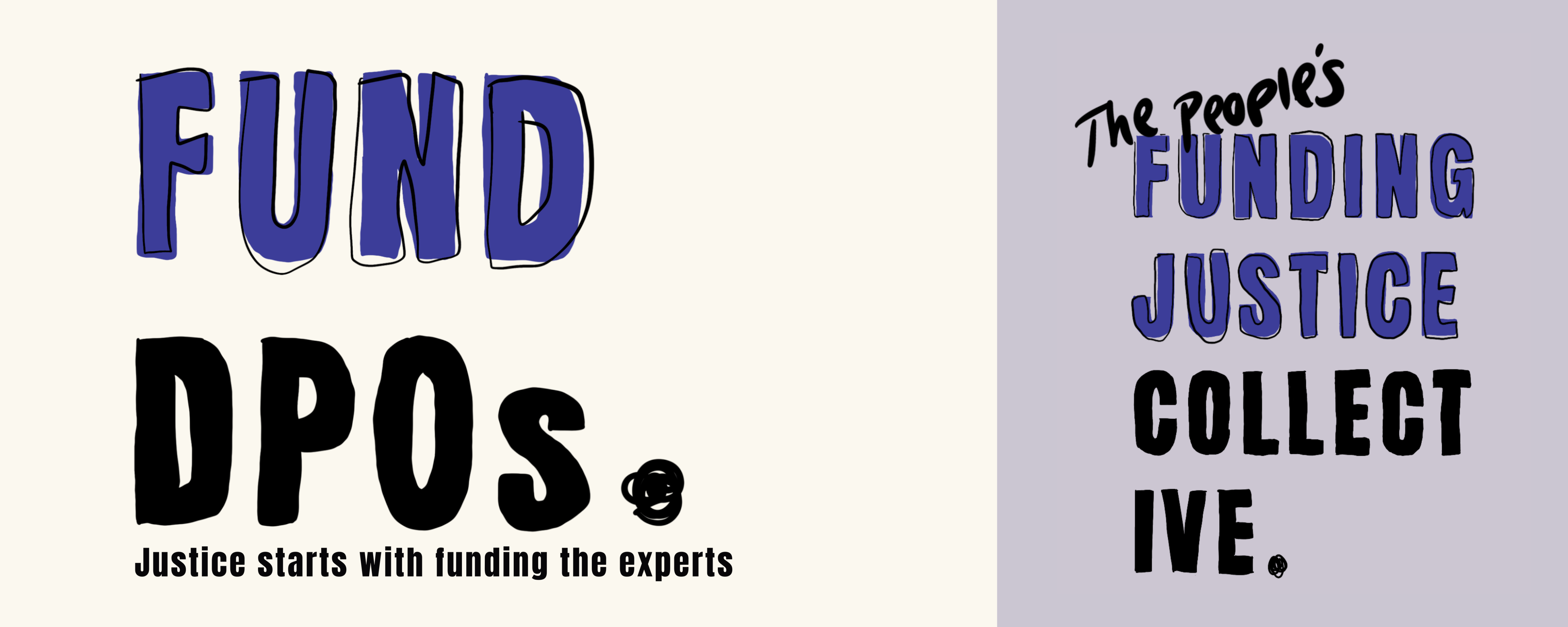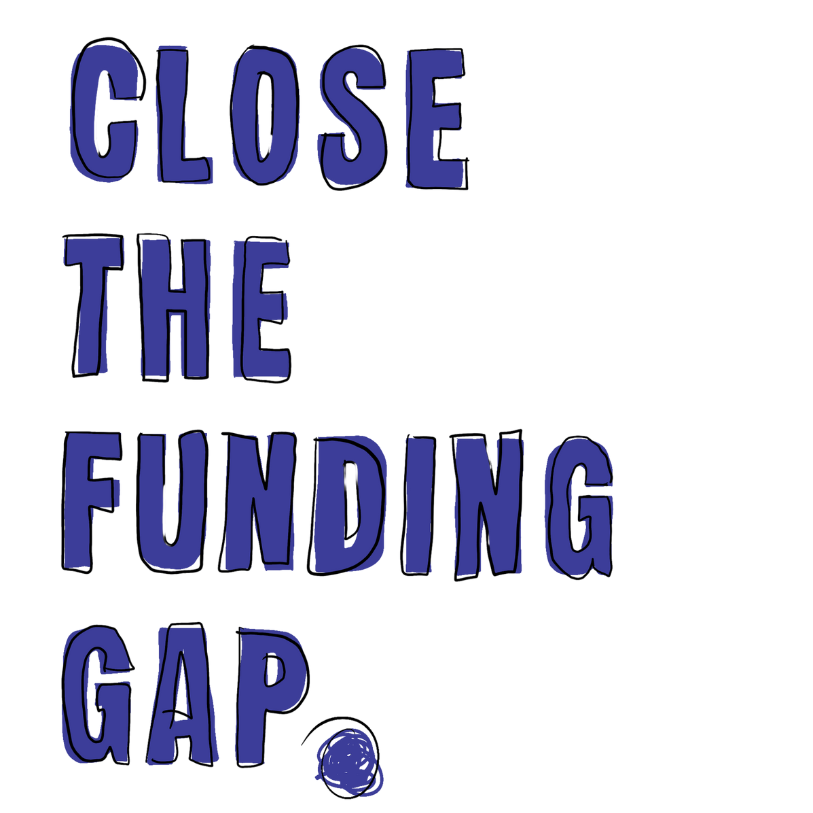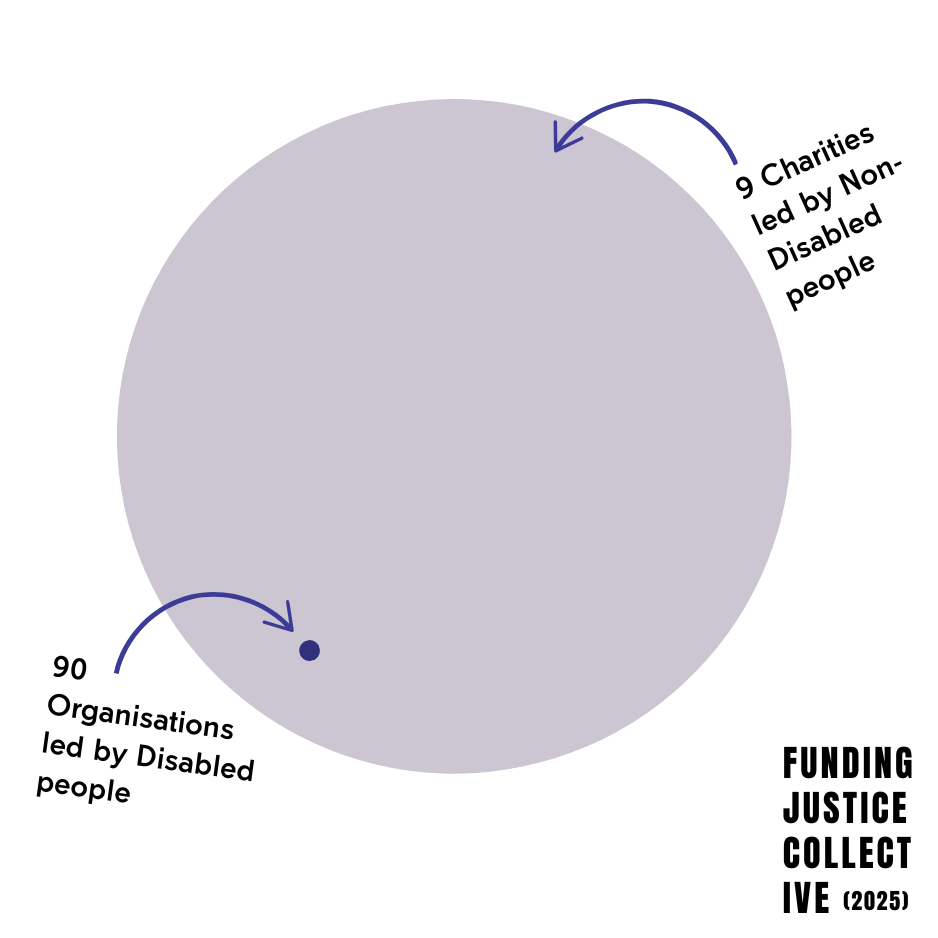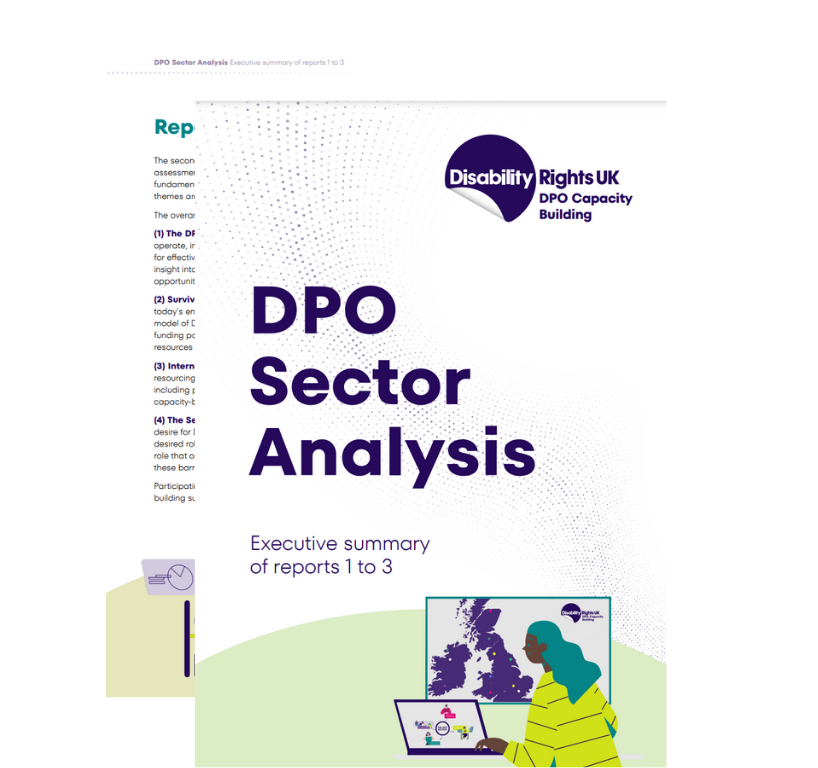
The Representative Voice of our movement: Disabled People’s Organisations
Led By the People, Run by the Community, Working for ourselves!
For over 40 years, Disabled people have been the experts in social change and supporting our own communities. We broke ourselves out of forced institutionalisation and created places of our own; we designed the UN Convention on Our Rights, and we now work every day to end systemic ableism in your lifetime. Yet the funding system still gives millions—disproportionately— to large charities of non-disabled people who pretend to speak for us.
The funding justice collective is changing that. We’re a coalition of organisations and grassroots groups led by and for Disabled people* (Disabled People’s Organisations, DPOs). We’re demanding that funders pass the mic – and the money – to the people who know our needs best: us.
Right now, for every £100 given to disability rights (led by non-disabled people), just £2.70 reaches organisations actually led by disabled people (Disability Rights UK, 2025). The traditional funding system has failed to recognise the unique contributions and needs of disabled communities and favoured large charities that don’t have our lived experience.
But not for long: We're working to close the funding gap between the community and the organisations who talk over us.
We’ve produced a plan based on 40 years of community expertise and lived experience. We know how to equitably distribute funding back to the people and divest from organisations that speak over us. We believe it is essential that funders respond to the funding gap by co-producing with us to invest back into the disabled community.
Now, we’re inviting those who fundamentally believe in representation and Justice, to join us.

Who Are We?
We are a coalition of organisations and grassroots groups led by and for Disabled people* (Disabled People’s Organisations, DPOs). We are founded on the principles of Disability Justice (Sins Invalid, 2015) and the Social Model of Disability*. We believe in the Social Model of Disability, the cultural model of Deafness, and Disability Justice.
We aim to dismantle systemic and institutional barriers and advocate for the rights and inclusion of Disabled people in all aspects of society.
We’re endorsed by the DPO Forum England, facilitated by Disability Rights UK, and supported by funders and social justice allies who believe in funding the community.
What are DPOs and By-And-For Organisations?
An organisation or group where 75% of its board and 50% of its staff and volunteers identify as Disabled is called a Disabled Peoples Organisation (DPO) or Deaf and Disabled Organisation (DDPO).
We’re both our community and serve our community. It makes us types of "by and for" organisations.
A "by and for" organisation is led by and for it’s community members. By and For’s have a long history of ensuring the voices and needs of its own community are at the forefront of advocacy and initiatives.
We’re disabled communities fighting for funding justice—and we know we’re not alone.
We know that racialised communities, LGBTQ 2S+ people, migrants, Roma, refugees, asylum seekers and other marginalised communities are also spoken over by those control the money but don’t share our lives. We stand in solidarity with all ‘by-and-for’ movements—because justice must be led by those who live it. Funding justice isn’t just a Disabled people’s issue—it’s a power issue. Who gets to define needs? Who’s financed to make change?
If your movement is led by those most affected, Join us. The system divides us—but our struggles are connected.

Who Gets the Money? A Look at Unfair Funding in the Disability Sector
Our upcoming report (Disability Rights UK, 2025) shows just how unfairly funding is spread in the disability space.
In 2022-23:
- £460 million in government contracts went to 9 large disability charities—none led by disabled people (shown by the big purple circle in the figure to the left).
- Just £12.5 million reached 90 Disabled People’s Organisations (DPOs)—groups led by and for disabled people (shown by the tiny dark indigo circle).
That means:
- For every £1 given to disabled people’s orgs, non-disabled-led orgs received £37.
- 97.3% of all disability funding flows to orgs that do not represent us.
The Consequences:
DPOs are stretched to breaking point:
- 93% report rising demand from disabled communities (Advice UK, 2024).
- 41% expect closure due to funding shortages.
- The system reinforces dependency:
Non-disabled-led orgs control resources, dictate priorities, and often exclude DPOs from decision-making, despite lacking lived experience. - Broader funding injustice:
- Only 5% of UK grants from leading funders support social justice work (Civic Power Fund, 2025).
- A mere 0.2% of funds go to grassroots organising (Civic Power Fund, 2025).

Join our Movement for Funding Justice!
We’re inviting those who fundamentally believe in representation and Justice, to join us. Whether you’re a funder, a local authority, a DPO/DDPO or an allied social justice movement, your voice and action are vital in driving meaningful change. Join the Collective and act in solidarity with representation. We especially invite other ‘by-and-for’ social justice movements to join us: Your fight is ours. Together, we’ll start funding real community power.learn more, email rebecca.tayler-edwards@disabilityrightsuk.org.
A collection of analyses on Funding Justice
We're experts on how to support our organisations and the Disabled Community. We've created a series of analyses and essays on Funding Justice for further reading and in-depth support.

Want to know more about Disabled People’s Organisations?
Read our Innovative and Coproduced Research on the Sector. Disability Rights UK's 'DPO Sector Analysis' (2023), disAbility Cornwall's 'The State of the DPO Sector' (2022), and Inclusion London's 'Understanding the needs of DDPOs in England' (2021) examine the current socio-economic climate of the DPO sector. Some challenges we face include increased competition for funding, demands for rigorous evidence-based campaigns, external bias, and a decreasing workforce. The comprehensive research reports illustrate the UK’s sole sector assessment model and provide evidence-based recommendations for developing a sector led by disabled people.
Footnotes
- Disabled people: The term ‘Disabled people’ in this campaign covers the following groups of people: people with physical impairment, visual impairment, Blind, Deaf people and people with hearing loss, long-term health conditions, invisible impairment, people with learning difficulties, people who experience mental distress and people who are neuro-divergent.
- Disabled Peoples Organisations: An umbrella term for an organisation or group where Disabled people represent at least 75% of the board and 50% of staff and volunteers. DPOs actively demonstrate a commitment to the Social Model of Disability through its work, values and operations. Under the umbrella of DPO are Deaf and Disabled People’s Organisations (DDPOs), User-led Organisations (ULOs), Disabled-People Led Groups (DPLGs) and Intersectional DPOs. An in-depth description of DPOs and By-and-For Organisations can be found in our Analysis ‘We, Disabled People’.
- The Social Model of Disability: A framework that emphasises that disability is not an inherent trait of an individual but a result of barriers and discrimination imposed by society because a person’s mind and body function differently from what is considered 'normative'. An in-depth description of the Social Model of Disability can be found in our Analysis ‘The Tragedy Model versus the Social Model of Disability’.
- Disability Justice: A framework and movement that goes beyond the traditional civil rights-based approach to disability. It recognises the intersecting identities and experiences of Deaf and disabled people and focuses on collective liberation, interdependence, and the dismantling of all forms of systemic oppression (Sans Invalid, 2019).
- Disability Equity: Disability Equity combines the social model and disability justice; advocating that equality alone does not provide for the additional support that will remove disabling barriers and create justice.
Please note: We acknowledge the diversity of language preferences across our community and have strived to make space for different self-identifications. We recognise that terminology is a continual debate across our movement, and we ask readers to keep in mind that this document focuses on funding injustice against our self-led work.
